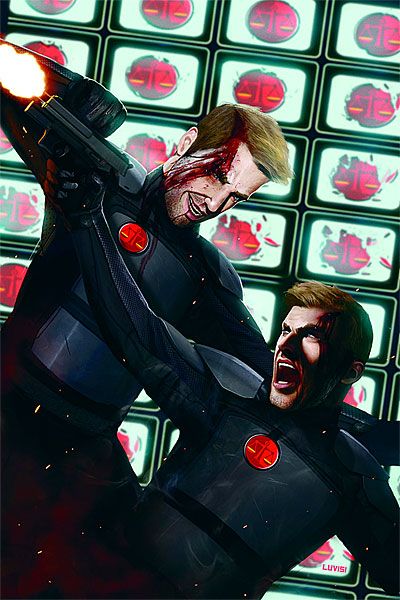Is there another Ivan Brandon "Nemesis" series in the works? Because the wrap-up to this issue feels like the end of Act II, not the full-on conclusion of the story.
This is really the eighth issue of Brandon's Nemesis saga, which began with "Final Crisis Aftermath: Escape," the most ambitious of the four different series bearing those first three words. But it certainly does feel as if this "Nemesis: The Imposters" series was the second act of a longer story. And if Act I -- in "Escape," which was more than a little bit like "The Prisoner" meets Philip K. Dick -- was about disorientation and the shifting lens of reality, and if Act II -- in "The Imposters," which has been "Mulholland Drive"-era David Lynch meets Scorcese meets Philip K. Dick -- was about uncertainty and doubling, then what will Act III offer, if we ever see it?
Answers, one would hope.
And not answers in an info-dump, Wikipedia kind of way. And, yes, the finale of "Lost" comes to mind as a particularly recent example of what not to do at the end of an ambitious and ambiguous series. But the truth is that after two, complete, four-issue series from Ivan Brandon starring Tom Tresser, we still don't know exactly what's going on in his world. And the final page of this final issue of "The Imposters" has Dick Grayson's Batman saying, to Tom Tresser -- aka Nemesis -- "It doesn't make any sense," as the real Tom Tresser watches through a monitor.
Or is it not the real Tom Tresser? Is that the point? That Tom Tresser, master of disguise, master of superhero espionage hijinx, has such an indistinct identity that he could be the man inside prison, talking to Batman, or the man watching the whole thing on the monitor? Thematically, it's fascinating. It's exciting in its attempt to question the notion of identity within a comic book series that has been about characters posing as other characters. But as the final issue of a DC superhero miniseries, it doesn't make for an effective ending to the narrative.
Cliff Richards has done nice work on this series all along -- his work reminds me of what it might look like if Eric Powell decided to try to draw in the style of John Cassaday -- and his characters almost seem to have faces that shift around inside the contours of their heads. As if everyone in this comic is unable to define their own identities. As if everything is in question, and nothing may really be as it seems.
All of that is quite interesting, and though this issue concludes the plot about the shadowy council and their secret leader (maybe), it works better in a musical sense than in a narrative sense. What I mean by that is that the rhythm of the comic feels right, and it has a resonant tone, and it has a startling kind of harmonious unity to it. But it doesn't make a whole lot of what you might call "sense." And if you're looking for clarification on what exactly has been happening in the weird, wild world of Tom Tresser, you won't get many answers here.
But perhaps the questions are the answers.
Cue ominous "Lost" music, and the white words "Nemesis: The Imposters" floats through the screen.

